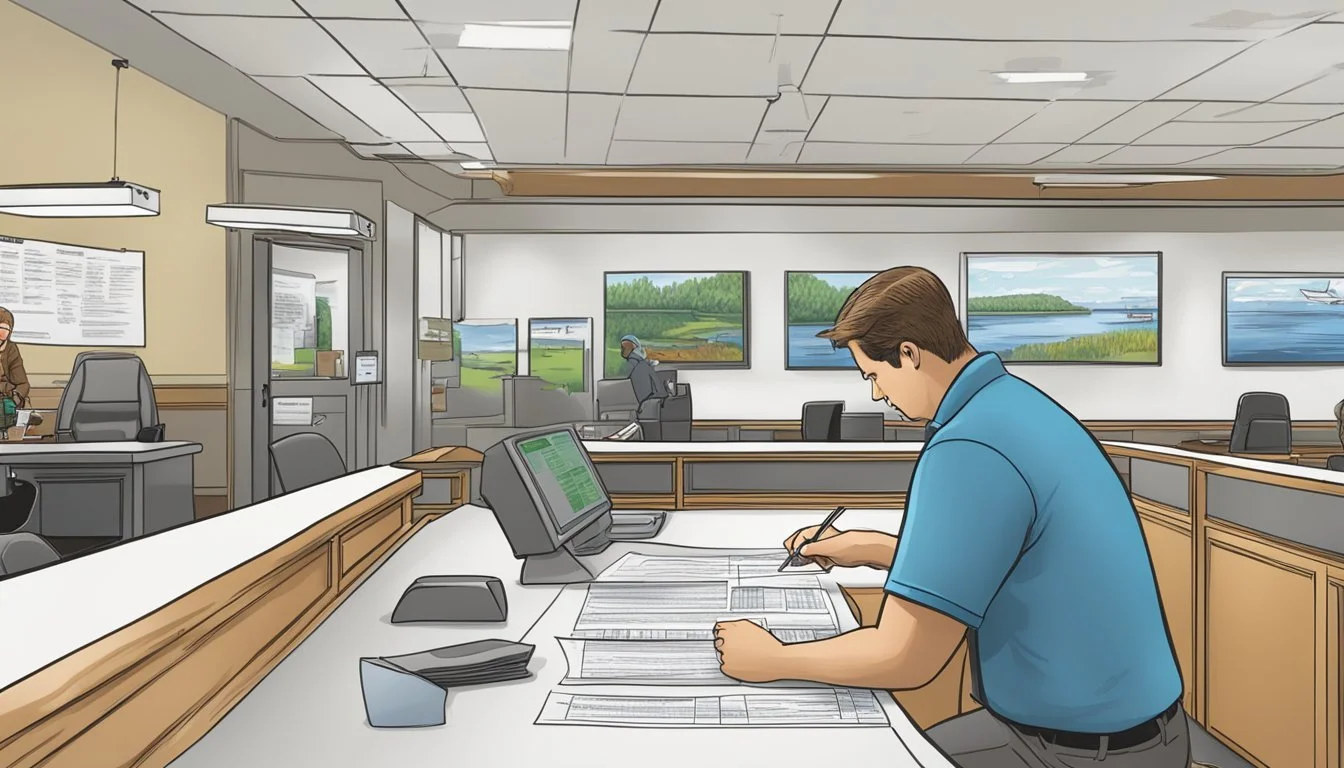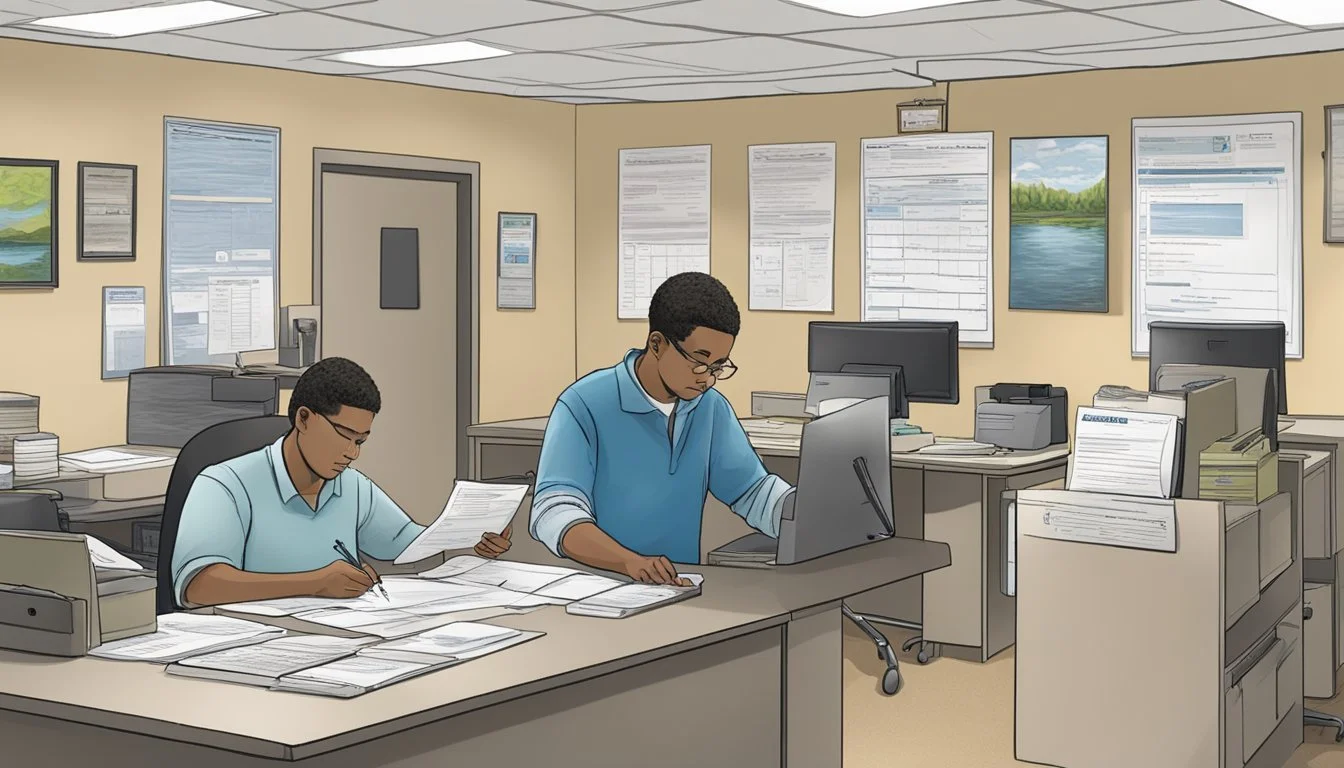How to Get a Massachusetts Freshwater Fishing License
A Step-by-Step Guide
Securing a freshwater fishing license in Massachusetts is a straightforward process governed by state regulations, ensuring that both the angler's interests and the preservation of aquatic ecosystems are upheld. Anyone aged 15 or older planning to fish (What wine goes well with fish?) in the numerous freshwater bodies across the Commonwealth must have a valid fishing license. MassWildlife, the agency responsible for the conservation of freshwater fish and wildlife in the state, supplies these licenses. Residents between ages 15-17 and those who are 70 years or older are eligible to receive their licenses for free, which not only legalizes their fishing endeavors but also contributes to conservation efforts.
The distinction between freshwater and saltwater fishing is important, as a separate permit is required for marine endeavors. To fish in saltwater, anglers need to secure a saltwater permit, which is different from the freshwater fishing license. The licensing system supports a range of endeavors from casual freshwater fishing trips to more targeted species fishing, which may require additional permits such as the Atlantic Highly Migratory Species Permit for federal waters. Funds from license purchases directly assist in efforts such as fish stocking, habitat improvement, and ensuring sustainable fishing for future generations.
It is critical for anglers to understand that fishing without a valid license or permit may lead to legal penalties. Licenses can be conveniently obtained online or through local agent locations. By adhering to these requirements, Massachusetts maintains a delicate balance among recreational fishing, wildlife conservation, and the interests of diverse aquatic habitats within the state.
Eligibility Criteria for Freshwater Fishing Licenses
Different criteria are established for Massachusetts residents and non-residents to obtain a freshwater fishing license. Those falling into specialized categories such as persons with disabilities or the blind have distinct provisions.
Resident Criteria
Massachusetts defines a resident as anyone who has resided in the state for a continuous period of six months or is domiciled for purposes of attending college or serving in the armed forces. Residents must meet an age requirement; anyone 15 years and older needs a license, while those under 15 may fish without one. For residents with disabilities, the state makes exceptions. Residents must submit a Certificate of Blindness from the Massachusetts Commission for the Blind or a doctor's certification of an intellectual disability or paraplegia to avail of any concessions.
Non-Resident Criteria
Non-residents are eligible for a Massachusetts freshwater fishing license without an established period of residence. Similar to residents, the age requirement applies—only those younger than 15 are exempt from holding a license. Pricing for licenses differs for non-residents, typically higher than resident fees. Non-residents with disabilities are also eligible for special considerations but must provide adequate proof of their condition, analogous to the documentation required of residents.
Types of Fishing Licenses
Massachusetts offers a variety of fishing licenses to cater to both freshwater and marine anglers. The appropriate license or permit ensures that fishing activities support the conservation efforts within the state.
Freshwater Fishing License
Individuals aged 15 or older must obtain a Freshwater Fishing License to legally fish in Massachusetts' inland waters. Residents aged 15-17 and 70 or above are eligible for a free license. For residents aged 18-69, the annual fee is $29.50. Non-residents pay $39.50 for an annual license. These licenses fund conservation and stocking programs which help maintain healthy fish populations.
Recreational Saltwater Fishing Permit
For those interested in saltwater fishing, a separate Recreational Saltwater Fishing Permit is required. Anglers over 16 years old must have this permit to fish in the marine waters and up to three nautical miles from coastal river mouths. The permit covers activities such as fishing for striped bass or lobstering.
Highly Migratory Species (HMS) Permit
Anglers intending to target Highly Migratory Species like tuna and shark in federal waters will require an Atlantic Highly Migratory Species Permit. This federally issued permit is a requisite regardless of the angler's age, supporting sustainable fishing practices for species that travel long distances.
Purchasing Options and Procedures
To obtain a Massachusetts freshwater fishing license, one has several straightforward options: online, in-person, or by phone. Each method is designed to accommodate the varying preferences of applicants.
MassFishHunt Online System
The MassFishHunt platform is the primary method for acquiring a fishing license. One can easily access this system through a smartphone or computer. It allows users to:
Purchase and print licenses immediately.
Utilize a credit card for secure payment.
Manage their account and report harvests.
To use MassFishHunt, an applicant simply follows these steps:
Visit the official MassFishHunt website.
Create or log into an existing account.
Select the appropriate fishing license.
Complete the required information.
Submit payment and print a paper copy of the license.
In-Person at License Agent Locations
One may also obtain a license in-person at various designated license agent locations across Massachusetts. Local vendors, including:
Sporting goods stores
Tackle shops
Most city and town clerks offices
provide this service. When purchasing in-person, one should:
Locate the nearest license agent location.
Bring a valid form of identification.
Fill out the necessary paperwork.
Make payment, typically via credit card or cash.
Receive a printed paper copy of the fishing license.
By Phone
For those who prefer to purchase over the phone, Massachusetts offers a telephone service. The process involves:
Dialing the provided phone number for license purchase.
Verifying one's identity and providing the necessary information.
Completing the transaction with a credit card.
A paper copy of the license will be mailed to the individual following the phone transaction.
License Fees and Additional Permits
Navigating the costs and requirements for a Massachusetts freshwater fishing license involves understanding the fee structure and any additional permits that might be necessary.
Fee Structure for Various Licenses
Freshwater Fishing Licenses The fee for an annual freshwater fishing license for Massachusetts residents typically costs around $27.50, while for non-residents it is around $39.50.
Saltwater Fishing Permits A separate permit, known as the Recreational Saltwater Fishing Permit, is required for saltwater fishing. This is priced at $10 for both residents and non-residents for one year.
Combination Licenses For those seeking both freshwater and saltwater fishing opportunities, combination licenses are available, potentially offering a saving over purchasing each permit separately.
Lifetime Licenses Lifetime fishing licenses are an option for those who fish frequently and want to avoid annual renewals. These licenses are priced based on age categories and provide a long-term value.
Additional Costs:
Administrative fees: When purchasing online, buyers might be subject to a small administrative fee.
Agent fee: Buying from a license agent might incur an additional convenience fee.
There can be fees for stamps like the Wildlands Conservation Stamp required for certain activities.
Additional Permits and Stamps
Certain fishing activities in Massachusetts may require additional permits or stamps on top of the standard fishing licenses.
Wildlands Conservation Stamp Most sportsmen over 15 years old are required to purchase this stamp when buying their fishing license. The stamp helps to fund the preservation of critical habitats.
Permits for Specific Species For fishing of particular species, like green crabs (What wine goes well with crab?), separate permits may be necessary.
It's imperative for anglers to verify the need for such additional permits or stamps before engaging in fishing to ensure legal compliance and support the management of the state’s aquatic resources.
Fishing License Usage and Restrictions
When purchasing a Massachusetts freshwater fishing license, anglers must understand where to use the license and be aware of any reciprocal agreements or exemptions that apply.
Where and How to Use the License
A Massachusetts freshwater fishing license allows anglers to fish in a variety of freshwater environments including lakes, ponds, rivers, and streams throughout the state. These licenses are required for residents and non-residents alike to maintain the health and sustainability of the fish population. It is imperative to note that these licenses do not permit fishing in saltwater—anglers planning to fish in the ocean must acquire a separate Mass saltwater fishing license.
Reciprocity Agreements and Exemptions
Massachusetts has reciprocity agreements with neighboring states, including New Hampshire, Rhode Island, Connecticut, and Maine. These agreements allow for mutual recognition of fishing licenses for certain border waters. However, individuals should verify specific waters covered by these agreements before fishing.
Exemptions to the license requirement include:
Individuals under the age of 15
Those who are blind, have an intellectual disability, or have paraplegia - these individuals may apply for a free license with the appropriate documentation
Residents should remain informed about fishing regulations to ensure they are in compliance with state laws and to contribute to the conservation of fish populations.
Renewals and Replacements
When a Massachusetts freshwater fishing license is close to expiration, individuals must renew their license for continued legality in fishing activities. All fishing licenses in Massachusetts expire on December 31 of each year, regardless of the purchase date. To ensure uninterrupted fishing privileges, anglers should renew their licenses before this date.
Renewing a License
Renewal can be conveniently done online through the MassFishHunt system. One should:
Visit the official MassFishHunt website.
Log into their account using their customer credentials.
Follow the prompts to renew their fishing license.
Additionally, one can renew their license in person at a variety of license agent locations or by mail, although in-person and mail-in details are beyond the scope of this section. The MassFishHunt portal also enables users to download and store digital copies on smartphones, eliminating the need for a physical copy.
Replacing a License
In cases where a fishing license is lost or damaged, replacements are obtainable through the same methods as renewals. To replace a license:
Access the MassFishHunt system and log into the account.
Select the option to reprint the fishing license.
Printing a copy of the license from home is possible after logging in, should the licensee need a hard copy. There may be a fee associated with the reprinting or replacement of licenses; it’s advisable to check the current regulations and fees on the MassFishHunt portal.
Regulations and Conservation Efforts
In Massachusetts, the conservation of fish populations and adherence to fishing regulations are fundamental to maintaining a sustainable angling environment. The state enforces clear guidelines to protect aquatic life while ensuring the enjoyment and fairness of recreational fishing.
Fishing Regulations
Licenses Required: Anglers must possess a valid freshwater fishing license, with specific types based on age, residency, and the waters fished.
Restricted Species: Certain fish species are protected under Massachusetts law. This includes Sturgeon, American Brook Lamprey, and Atlantic Salmon, among others that, if caught, must be immediately released back into the water.
Legal Methods: Massachusetts defines legal fishing methods, aiming to prevent overfishing and the harm of fish populations through illegal practices.
Conservation and Fish Populations
MassWildlife's Role: The Division of Fisheries and Wildlife, known as MassWildlife, oversees the management of freshwater fisheries resources across the state, from large lakes to small streams.
Conservation Measures: These measures include habitat restoration, monitoring of fish populations, stocking programs, and research on local ecosystems.
Public Involvement: The public's cooperation with ongoing conservation efforts and regulations is essential to the success of these programs, playing a major role in preserving the state's diverse and vibrant fisheries for future generations.
Additional Resources
When embarking on a fishing adventure in Massachusetts, anglers have a wealth of resources at their disposal. From expert advice to important regulatory information, these resources ensure that every fishing trip is rewarding and compliant with state laws.
Fishing Guides and Tips
Massachusetts offers a diverse range of fishing spots, including the picturesque bays of Cape Cod, where anglers can target species such as bluefish. Those seeking guidance can consult various fishing guides that detail techniques, lure selection, and best practices tailored to Massachusetts waters. For updated tips and regional fishing information, the following are recommended:
MassWildlife's Fishing Guide: Offers comprehensive details on the local fish species and habitat.
Local Bait and Tackle Shops: Provide real-time suggestions based on current fishing conditions and catches.
MassWildlife Office Information
The MassWildlife office is the ultimate resource for all regulatory and permitting needs. Anglers should be aware of the following specifics:
Resident Freshwater Licensing Fees:
Ages 15-17 and 70+: Free
Ages 18-69: Vary based on license type
Non-resident Minor (under 18) Fees: Nominal charge
To purchase a fishing license or permit, or to seek expert advice, individuals can contact the MassWildlife office:
Contact Number: (508) 389-6300
Official Website: MassFishHunt
This office also helps to ensure that anglers are up-to-date on Massachusetts fishing laws, which are crucial for protecting the region's aquatic ecosystems.
Support and Accessibility Services
Massachusetts actively provides support and assistance to ensure that all anglers, including those with disabilities, can obtain their fishing licenses and enjoy the state's fishing opportunities.
Support for Disabled Anglers
Massachusetts offers free freshwater fishing licenses to anglers who are blind, have an intellectual disability, or have paraplegia. To apply for a license for the first time, one must fill out an application specifically for this free license. This demonstrates Massachusetts' commitment to making fishing accessible to all.
Documentation and Certification Assistance
Documentation requirements are clear: first-time applicants must provide certification of their disability. This can typically be obtained from a licensed physician or the Commission for the Blind. Applicants for the free license should ensure they submit complete and accurate documentation to the Massachusetts Division of Marine Fisheries (DMF). The DMF does not charge a service fee for these specific licenses, promoting inclusivity in Massachusetts fishing and shellfishing activities.










